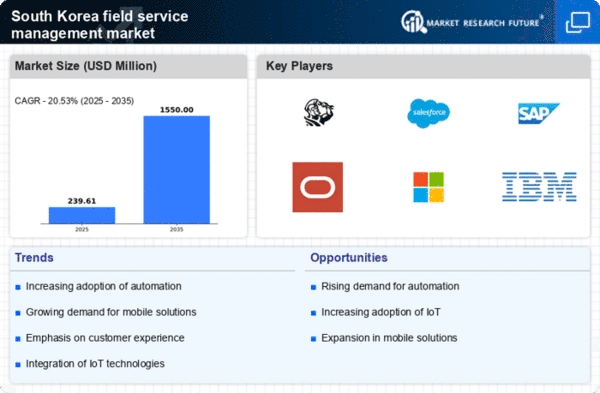Integration of Data Analytics
The integration of data analytics is becoming a pivotal driver in the field service-management market in South Korea. Companies are increasingly leveraging data to gain insights into customer behavior, service performance, and operational efficiency. By utilizing predictive analytics, organizations can anticipate service needs and proactively address potential issues before they escalate. This capability not only enhances customer satisfaction but also optimizes resource allocation, potentially reducing costs by 15-25%. Furthermore, data-driven decision-making allows businesses to refine their service strategies, ensuring alignment with market demands. As the importance of data analytics continues to grow, it is likely to play a crucial role in shaping the competitive landscape of the field service-management market.
Technological Advancements in Service Tools
The field service-management market in South Korea is experiencing a surge due to rapid technological advancements. Innovations such as IoT, AI, and mobile applications are transforming how service providers operate. These technologies enable real-time data collection and analysis, enhancing decision-making processes. For instance, the integration of AI-driven analytics can optimize scheduling and resource allocation, leading to improved operational efficiency. As a result, companies are likely to see a reduction in operational costs by up to 20%. Furthermore, the adoption of mobile solutions allows technicians to access critical information on-site, thereby increasing first-time fix rates. This trend indicates a growing reliance on technology to streamline service delivery, which is essential for maintaining competitiveness in the field service-management market.
Rising Demand for Efficient Service Delivery
In South Korea, the field service-management market is witnessing an increasing demand for efficient service delivery. Customers are becoming more discerning, expecting timely and effective solutions to their service needs. This shift is prompting companies to adopt advanced field service management solutions that enhance responsiveness and reduce service times. According to recent data, organizations that implement efficient service delivery models can improve customer satisfaction rates by over 30%. This demand is further fueled by the competitive landscape, where businesses strive to differentiate themselves through superior service. Consequently, companies are investing in training and development programs for their workforce, ensuring that they are equipped with the necessary skills to meet evolving customer expectations. This focus on efficiency is likely to shape the future of the field service-management market.
Emphasis on Workforce Training and Development
The emphasis on workforce training and development is emerging as a critical driver in the field service management market in South Korea. As technologies evolve, there is a growing recognition of the need for skilled personnel who can effectively utilize advanced tools and systems. Companies are investing in comprehensive training programs to equip their workforce with the necessary skills to adapt to new technologies and methodologies. This focus on development not only enhances employee performance but also contributes to higher customer satisfaction rates. Data suggests that organizations with well-trained staff can achieve service efficiency improvements of up to 20%. Consequently, the commitment to workforce development is likely to play a vital role in the ongoing evolution of the field service-management market.
Government Initiatives Supporting Digitalization
Government initiatives aimed at promoting digitalization are significantly impacting the field service-management market in South Korea. The government has launched various programs to encourage the adoption of digital technologies across industries, including financial incentives and grants for businesses transitioning to digital platforms. These initiatives are designed to enhance productivity and competitiveness, which is particularly relevant for service-oriented sectors. As a result, companies are increasingly investing in digital tools and platforms that streamline operations and improve service delivery. This trend is expected to drive growth in the field service-management market, as businesses seek to capitalize on government support to enhance their service capabilities and meet the demands of a digital economy.
















